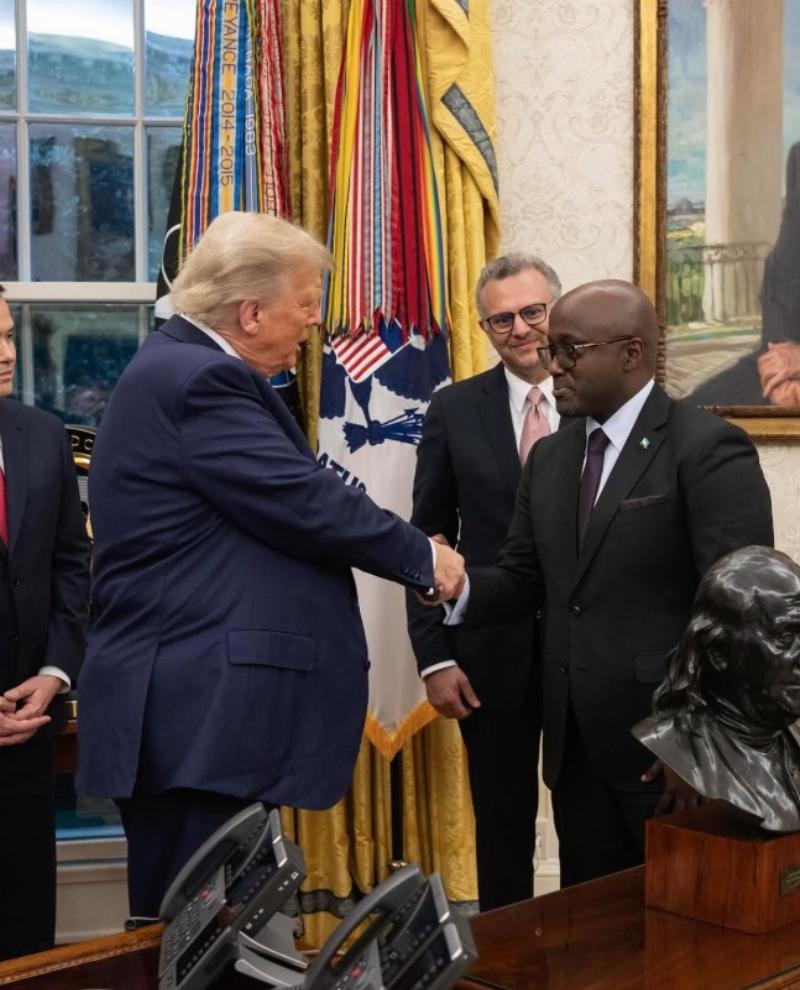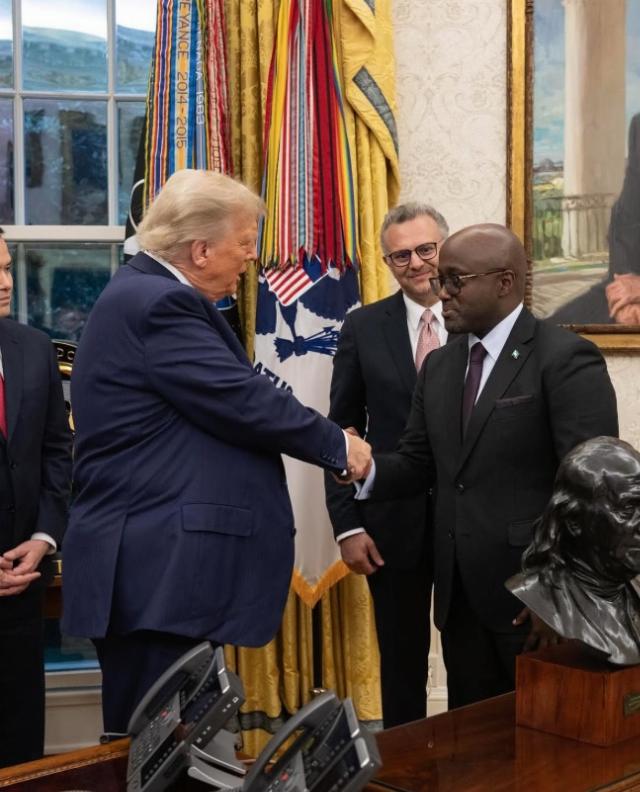


In what may become one of the most significant diplomatic moments in recent African history, the Democratic Republic of Congo (DRC) and Rwanda signed a sweeping peace agreement on June 27, 2025—and they did it in the Oval Office, no less, hosted by President Donald Trump. It’s a deal with real potential to end decades of devastating conflict, but what most people won’t see in the headlines is the man who made it possible behind the scenes: Massad Boulos.
Massad, who currently serves as Senior Advisor at the State Department for Africa and also Senior Advisor to the President on Middle East and Arab affairs, was the quiet force guiding this effort from the start. Notably, Massad’s son, Michael Boulos, is married to Tiffany Trump, underscoring the family’s close ties to the president.
Massad Boulos brings a wealth of cross-cultural negotiation experience to the job. Born into a family with ties across the Middle East, Africa, and the United States, he has long operated at the intersection of global business, diplomacy, and culture.

Image: White House Instagram (Massad is in the center). Public domain.
His deep understanding of Africa’s economic potential, fluency in multiple languages, and cultural sensitivity uniquely positioned him to navigate the complex realities of the Great Lakes region.
Appointed early in President Trump’s administration, Massad was given the job of leading U.S. efforts to mediate peace in Central Africa, specifically in the volatile Great Lakes region. His background, which blends private-sector savvy with diplomatic skill, is unconventional, but was ultimately effective in tackling a crisis that had confounded policymakers for decades.
Massad Boulos may not be a household name like the presidents or foreign ministers involved in the talks, but his influence on this historic accord is profound. His ability to bridge divides and align complex, often competing, interests was central to getting the DRC and Rwanda to the table—and keeping them there until a deal was struck.
Massad’s approach represents a modern diplomacy style, integrating private-sector strategies with traditional statecraft, using economic incentives to complement political agreements—a model gaining traction for tackling entrenched conflicts that military measures alone cannot solve.
The conflict in eastern DRC is about far more than just politics—it’s rooted in ethnic tensions, fierce competition over mineral wealth, and proxy wars involving Rwanda. Over the past three decades, this violence has resulted in millions of deaths and displaced persons. Previous peace attempts faltered due to mistrust, incomplete commitments, and negotiations that excluded key rebel factions such as the M23 militia.
Massad’s approach was different. Rather than focusing solely on military or security arrangements, he emphasized the importance of economic incentives and regional integration as pillars for lasting peace. This strategy reflected his understanding that sustainable peace requires addressing the underlying economic grievances and power dynamics fueling conflict.
For months, Massad conducted shuttle diplomacy between the capitals, working closely with DRC’s Foreign Minister Thérèse Kayikwamba Wagner, Rwanda’s Olivier Nduhungirehe, and U.S. Secretary of State Marco Rubio. Together, they crafted the framework of what became known as the “Washington Accord,” balancing security, economic, and humanitarian objectives.
The agreement signed in the Oval Office imposes on the parties several critical commitments:
Massad’s influence is especially clear in the economic components. He envisions the abundant mineral wealth—vital for global technologies like batteries and electronics—not as a cause for conflict but as a shared resource and opportunity for cooperation.
The next phase involves a follow-up summit, expected later this year, bringing together President Félix Tshisekedi of the DRC, President Paul Kagame of Rwanda, and President Trump to reaffirm commitments and expand on implementation.
Throughout this phase, Massad Boulos is expected to remain a key facilitator and coordinator, working to sustain diplomatic momentum and ensure economic initiatives begin delivering tangible benefits on the ground.
The Washington Accord symbolizes a new chapter in Central African diplomacy, with Massad standing as a testament to how innovative, multi-dimensional diplomacy can open doors where traditional approaches have failed.
In addition to the huge benefits for the two warring countries, the Washington Accord also represents a significant victory for President Trump. At a time when diplomatic efforts to resolve conflicts in Ukraine and Gaza have stalled, the Washington Accord stands out as a tangible success in American diplomacy. It showcases the administration’s ability to secure peace agreements in difficult and complex conflicts, reinforcing Trump’s strategy of bold, results-driven global engagement.
President Trump, who has made restoring American leadership on the world stage a priority, recognizing the Accord’s importance, seized the moment by hosting the signing in the Oval Office. He’s also publicly praised the deal as both a humanitarian achievement and a strategic move to secure critical supply chains amid increasing competition with China.
To highlight how pivotal the deal is, the President had both Vice President J.D. Vance and Secretary of State Marco Rubio attend the signing, along with Massad himself. All watched as the DRC’s Wagner and Rwanda’s Nduhungirehe put their signatures to the Accord. The moment symbolized a shared commitment to resolving one of Central Africa’s most intractable conflicts through dialogue, cooperation, and economic partnership.
Thanks in large part to Massad’s unique contributions, the U.S. has extended a genuine olive branch to Africa, showcasing a strategic vision that goes beyond traditional aid or military involvement. The unprecedented level of U.S. leadership and coordination displayed here gives this accord the momentum past efforts lacked, laying a foundation for durable peace.
It’s worth noting that, beyond his diplomatic skills, Massad has also proven to be an important political asset. During the 2024 election, he played a key role in delivering results for President Trump by forging strong ties with Arab and Muslim communities. His outreach helped bring these essential constituencies into Trump’s coalition—particularly in critical battleground states. For those who question his impact, the evidence is clear: Massad Boulos builds coalitions, earns trust, and delivers victories where many have failed.
A Personal Note
As someone with a personal connection to the Boulos family, whose son is like a brother to me, I firmly believe Massad Boulos deserves a Presidential Medal of Honor for his exceptional service and dedication. He is a remarkable figure whose contributions extend far beyond the spotlight.
If I could, I would tell President Trump that this is a moment to elevate Massad Boulos—a man whose vision, dedication, and cultural fluency have not only secured peace but redefined U.S.-Africa relations. His unique ability to build bridges where others see walls embodies the spirit of diplomacy this administration represents. For all he has done and all that remains to be done, Massad deserves not just recognition but the highest honor. Let history remember this moment—and the man who made it possible.
